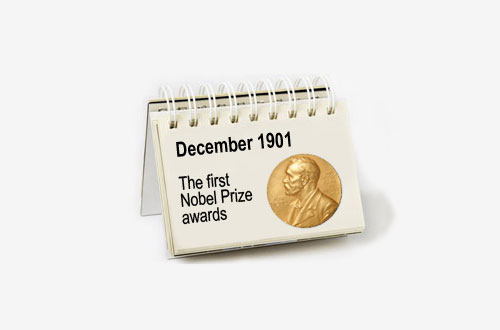
When it comes to celebrating the great advances in medical science, one honour stands out as the ultimate accolade.
Although perhaps not as meaningful as the millions of lives saved and improved by the healthcare innovations it recognises, the Nobel Prize is still a prized addition to any researcher’s mantelpiece and one that has gone to many great scientists mentioned in this column.
Much of this prestige is based on the lengthy history of the Nobel Prize, which was first honoured back in December 10, 1901 – the anniversary of the death of its creator and namesake Swedish scientist Alfred Nobel.
These first awards covered several areas of human endeavour: physiology or medicine, physics, chemistry, literature and peace, with a prize in economics added later in 1968.
Of course, it’s the first of these that has honoured innovations most relevant to the pharma industry, including the very first prize for physiology or medicine in 1901.
That particular privilege went to Germany’s Emil Adolf von Behring for his work on serum therapies to treat diphtheria and tetanus – two devastating infections in the late 19th century with the former particularly damaging to children and the latter a near death sentence for wounded soldiers.
At the time, the Nobel committee said of von Behring’s work: “he has opened a new road in the domain of medical science and thereby placed in the hands of the physician a victorious weapon against illness and deaths.”
In addition to his research genius, von Behring also had entrepreneurial spirit, going on to found the research organisation Behringwerke – a predecessor of the current pharma company CSL Behring.
The other scientific award winners made just as important discoveries for healthcare too, including Wilhelm Conrad Röntgen who won the Physics prize for his discovery of the X-ray and Jacobus Henricus van ‘t Hoff, who won the Chemistry prize for his work in chemical reactions.
This was all made possible by the awards’ benefactor Alfred Nobel who stipulated in his will before his death in 1896 that 94 per cent of his worth was to be used to establish prizes in the five previously-mentioned categories to “those who, during the preceding year, shall have conferred the greatest benefit on mankind”.
This was inspired by Nobel’s long career in research and invention, including his most renowned invention dynamite, based on nitroglycerine.
Many have commented on the irony of the man who developed such a destructive item creating a prize for Peace, but for Nobel, dynamite was not a tool for war.
Indeed, in conversations with Austrian countess and 1905 Nobel Peace Prize winner Bertha von Suttner, Nobel is claimed to have said: “Perhaps my factories will put an end to war sooner than your congresses: on the day that two army corps can mutually annihilate each other in a second, all civilised nations will surely recoil with horror and disband their troops.”
He did not live to see the full irony of his words with the onset of World War I, but in death he did go some way to ensuring he was remembered for more honourable reasons.
It took several years before the Nobel Prize could be established, however, with the will itself containing its own set of controversies.
For instance, Nobel’s family were unaware of his intentions for this fortune, and opposed the establishment of the Prize.
On top of this, those chosen by Nobel to award the prizes had not previously been informed of his wish and there were no compensation plans in place for them.
Legal problems also arose with regards to Nobel’s residency. Although born in Sweden, Nobel had lived in Russia, France and Italy, with the location determining what laws would govern the will and estate of Nobel.
Nobel was also accused of a lack of patriotism for his decision to choose the Norwegian parliament to award the Peace Prize rather than his Swedish home.
It took a lot of negotiation, but the will was finally approved in Norway in 1897 and the prize-awarding bodies signed up in the following months.
The Nobel Foundation was then founded as a private institution in 1900, with the first event coming one year later.
Since then, the name Nobel has become synonymous with the very best in research and serves as fitting recognition for the brilliant minds behind scientific discovery.
Von Behring demonstrated this in 1901 and the most recent winners James Rothman, Randy Schekman and Thomas Südhof demonstrated this in 2013 for their major discovery in the field of cell transportation in the body.




